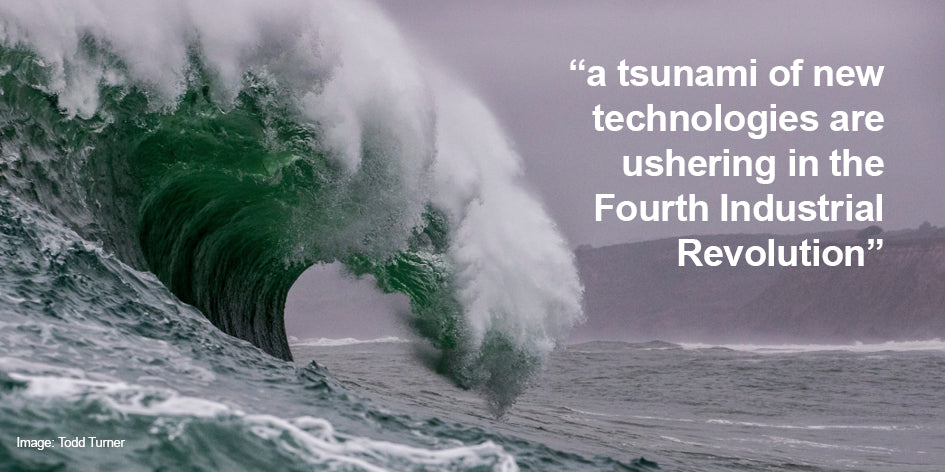Technological development is characterised by long periods of incremental evolution and consolidation punctuated by periods of radical performance improvement. Savvy entrepreneurs always have their eye on catching the next wave, and the wavelength is shortening dramatically. Today we face a tsunami of new technologies ushering in the Fourth Industrial Revolution.

Powering this wave are the ever-increasing billions of smart devices, products, machines and infrastructure becoming connected as the Internet of Things (IoT). Concurrent advances in adjacent technologies including Artificial Intelligence, Augmented Reality, 3D Printing and Blockchain which are amplifying the scale of the transformative impact and the merging of our real and digital worlds.
Leaders within established organisations are still responding to the current wave of digital technologies, the resultant disruption to their business models, and cybersecurity risks inherent in their digital transformation. As individuals we are reflecting on the loss of personal privacy and the overwhelming demands on our time and attention of a constantly connected existence. But, as the ‘S-curves’ of social, mobile, analytics and cloud technologies plateau out, we must prepare for the this 'post-digital’ era.
Every business needs a clearly defined strategy for where to play and how to win and, for strategists, an understanding of the competitive implications of these transformative new technologies is essential. They are not only enabling fundamentally new ways to compete but creating entirely new playing fields.
Creating a Sustainable Future of Shared Value
The benefits of today’s internet have proved largely asymmetrical, with the value of the personal data of billions captured by a few now gargantuan organisations: Facebook, Apple, Amazon, Netflix, Google in the West. Baidu, Alibaba, Tencent to the East. Inequality has been widening since the dawn of the computerized age that ushered in the last revolution, leading us to the current inflexion point in the evolution of our globalised society, where the economic and political discourse has become fractured, and capitalism called into question.

Arguments that these new technologies will underpin a new era of productivity, satisfaction and prosperity may well prove true but are not entirely credible for an anxious populace, wary of machines that are becoming self-aware, social and perhaps one day sentient. It is incumbent on leaders not to accept technological determinism, but to interrogate and anticipate the nature and risks of this next wave of technologies, and to consider the role their organisations can play in harnessing their potential for the benefit of all stakeholders.
New value creation will increasingly be achieved through collaborating in entirely new ecosystems, whose value is defined by the depth and breadth of their data. Speed of learning is today’s competitive advantage and organisations can learn much about the strategies for success from today’s platform leaders. Visionary leaders are needed to navigate the highly ambiguous environment of this next revolution, to cultivate creative experimentation at speed towards a purpose, and to balance competition and co-operation as national borders give way to new crypto-economies.
